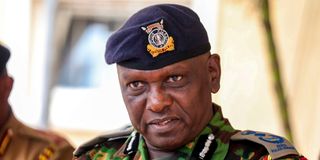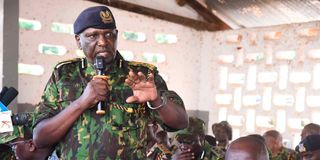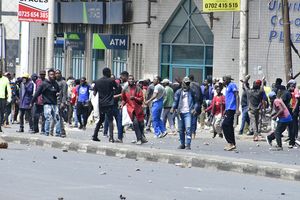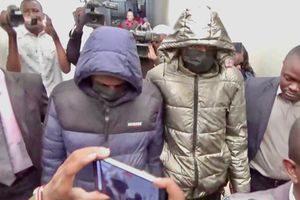
Inspector-General of Police Douglas Kanja.
Top police commanders met in Nairobi on Thursday to finalise strategies for handling next week’s planned protests, expected to last several days.
The commanders also submitted a comprehensive security plan to the National Security Council (NSC) in a meeting attended by President William Ruto. The plan outlines how the police intend to manage the protests and maintain order, particularly in the capital city.
Initial discussions were held on Tuesday at the National Police Service headquarters at Jogoo House.
A second meeting followed on Wednesday, where a harmonised operational strategy was drafted and agreed upon before being presented to the NSC.
Those present at the meeting were Inspector General of Police Douglas Kanja, Directorate of Criminals Investigations Director Mohammed Amin, Deputy Inspector General of Police Gilbert Masengeli and acting DIG Patrick Tito.
Inspector General Kanja is leading the preparations, according to sources familiar with police operations.
On Thursday, the Nation reached out to Mr Kanja who reiterated the police commitment to ensuring law and order while respecting the right to peaceful assembly.
“Yes, we are on top of things. Today we met with all commanders for a review of the strategic security plan. The police will follow all established procedures and I urge protestors to be peaceful and to follow police guidelines,” Mr Kanja told Nation on Thursday evening.
“Anybody (goons) thinking of infiltrating the peaceful demonstrations should be warned. They will spend a long time jail,” the police chief warned.
Security sources revealed that on Monday just hours after Deputy Inspector General Eliud Lagat announced he was stepping aside to allow investigations into the death of teacher cum blogger Albert Ojwang, Mr Kanja and Interior Transport Cabinet Secretary Kipchumba Murkomen attended a high-level security meeting at State House.
The agenda focused on how to manage the upcoming demonstrations, especially in Nairobi.
As part of the preparations, hundreds of police officers will be deployed to Nairobi’s Central Business District (CBD) and other key areas beginning Wednesday, June 25, when the protests are expected to start.
Officers from multiple formations including the General Service Unit (GSU), the Rapid Deployment Unit (RDU) and regular police units will be on the streets to monitor the situation.

Inspector General of Police Douglas Kanja speaks to chiefs and assistant chiefs from West Pokot, Baringo and Elgeyo Marakwet counties on April 28, 2025 as Interior Cabinet Secretary Kipchumba Murkomen looks on.
Those on foot patrol will be backed by colleagues in patrol cars and trucks, allowing for rapid response to any disturbances.
The GSU and Administration Police officers will be tasked specifically with breaking up any demonstrations that become unruly.
To facilitate peaceful protests, a separate team of officers from Nairobi Central Police Station has been designated to provide security to demonstrators. This is in anticipation that the protests will be peaceful and orderly.
The police plan also includes the deployment of water cannons which will be stationed at key locations in the city as a backup measure in case of escalation.
Roads earmarked for closure
In addition, police vehicles and trucks will be used to block access to sensitive areas such as Parliament Road, State House Road and other government buildings deemed high security zones. Several roads have been earmarked for closure during the protest period and diversions are expected to be announced in advance.
Depending on how the situation develops during the protests, police may also deploy mounted officers and dog units to reinforce their presence on the ground.
Unlike the June 2024 protests where the police were reportedly caught off guard, this time police commanders at the station level have been instructed to gather intelligence in advance.
Officers from the National Intelligence Service (NIS) have also been tasked with identifying protest organisers and financiers according to one senior security officer.
To ensure seamless coordination during the protests, senior police officers will be stationed at the Police Command Centre at Jogoo House. From there, they will monitor developments in real time and provide operational guidance to teams on the ground.
On Thursday, National Police Service spokesperson Michael Muchiri confirmed that a series of strategy meetings are underway to ensure the force is fully prepared.
“It is meeting after meeting now. We want to be well prepared and we will offer security,” he said.
Nairobi Regional Police Commander George Seda assuring residents of the capital that sufficient security measures had been put in place.
“We will provide enough security for protesters and for all other Kenyans,” Mr Seda said during a press briefing at his office on Wednesday.








